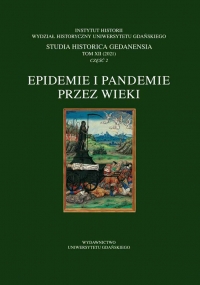„Zaraza zaczęła się od Egipcjan”. Dżuma Justyniana widziana z perspektywy pandemii COVID-19
“The plague began from the Egyptians”. The Plague of Justinian seen from the perspective of the COVID-19 pandemic
Author(s): Ireneusz MilewskiSubject(s): History, Comparative history, Social history, Ancient World
Published by: Wydawnictwo Uniwersytetu Jagiellońskiego
Keywords: the Justinianic Plague; late antiquity; early Byzantium
Summary/Abstract: This article considers the “Plague of Justinian” from the perspective of a person living for over a year in a situation of epidemiological threat, constantly “bombarded” in the media with a diversity of information relating to all aspects of the COVID 19 pandemic, including non-medical ones. The plague that erupted in the Byzantine Empire in the XVth year of the reign of the Emperor Justinian (541/542 CE) can certainly be seen as a pandemic. Between 541 and 750, one can note as many as eighteen waves of plague. From written records and on the basis of admittedly only partial archaeological data, we know that the plague affected the entire population of the Byzantine Empire, the barbarian kingdoms in the West, but also neighbouring lands: Ireland, Scandinavia, and Germany. IT very likely also reached lands to the east of the Oder. The article describes the causes and circumstances of the appearance of plague in the Byzantine Empire, its symptoms, its spread, ways of combatting it, and its consequences (including social and economic consequences). The article also attempts to estimate the number of victims of the epidemic in Byzantium.
Journal: Studia Historica Gedanensia
- Issue Year: 2/2021
- Issue No: 12
- Page Range: 13-30
- Page Count: 18
- Language: Polish

